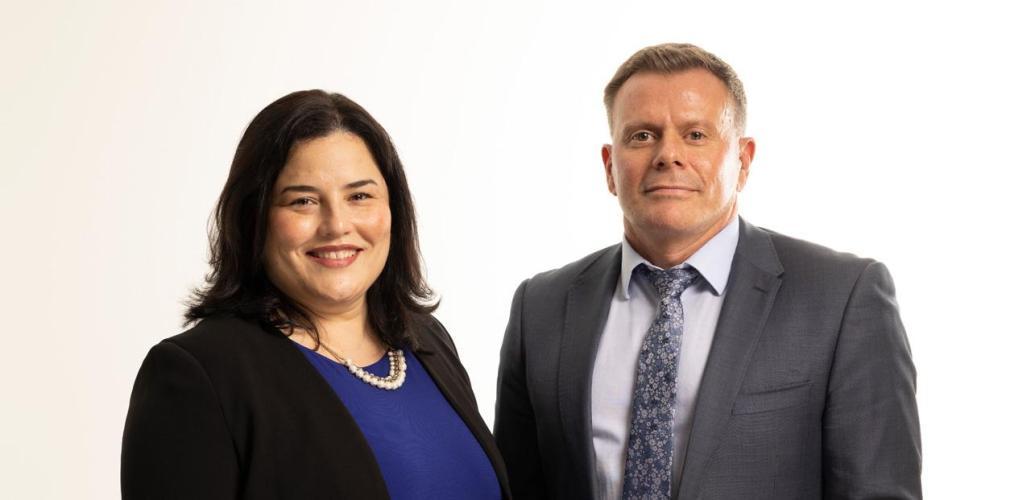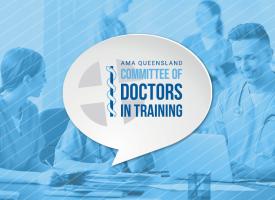President and CEO update - May 2024
Ahead of the State Budget, AMA Queensland has been advocating for the policies outlined in our Budget Submission 2024-25.

Our submission identifies 14 priority areas for attention, including workforce, wellbeing, preventative health, climate and sustainability, and women’s and First Nations health. This month we have focused on our recommendations for safer public hospitals, better funding for GPs, environmental sustainability initiatives, scope of practice, and end-of-life funding.
Hospital safety
In response to the increasing number of staff experiencing excessive workloads, inadequate resourcing and burnout, we shared our action plan for hospitals on World Safety and Health at Work Day.
Too many doctors are getting sick at work, assaulted or threatened with violence, or overworked to the point of exhaustion, and remain extremely concerned about the ramifications of speaking up on these issues.
We have seen some positive movements from the Queensland Government including the recently announced independent review into hospital sexual assault policies and procedures, financial incentives for doctors and other healthcare workers to relocate to regional areas, and financial support for GPs to upskill in obstetrics and anaesthetics.
These are positive yet long overdue first steps. The sexual assault review should be mirrored for occupational violence. Workforce incentives must include ways to retain those new staff and look after the health workers who are already there.
Doctors should not be experiencing any abuse or mistreatment in the workplace, and the Queensland Government must act now to protect our hardworking health workforce and attract and retain more staff.
The AMA Queensland Board, Leadership Team and Committee of Doctors in Training Chair will continue meeting with the HHSs to raise safety and work concerns and recommend solutions.
Patient care facilitators
The first trials of Patient Care Facilitators (PCFs) are about to begin in Ipswich and Logan.
The service models have been co-designed and will be delivered in partnership with the respective Primary Health Network (PHN), Hospital and Health Service (HHS) and local general practices.
The PCFs will work with the hospital-based discharge coordinator (HDC) to identify eligible patients, review their patient information and ensure discharge summaries are received. The PCF will contact each patient within four days of discharge and provide initial post-discharge followup and ongoing care as required.
The PCFs are an AMA Queensland recommendation. We know the risk of readmission to hospital is dramatically reduced if a patient can see their GP within a week of discharge.
This project aims to keep Queenslanders out of hospital by using GP practice nurses to:
- ensure patients discharged from hospital see their GP within seven days to reduce the risk of readmission; and
- facilitate better communication between hospitals and general practice.
The project has received $2.4 million in funding from the Queensland Government for two trial sites over two years.
This is a significant achievement based on the historical refusal by state government to fund general practice.
We look forward to seeing the results of these trials and will advocate for funding for them to be rolled out across all general practices.
End-of-life funding
We have called for transparency around how the $171 million for palliative care promised in the 2022-23 budget has been allocated.
This funding was welcome but it is unclear how it has been used and if it has been exhausted.
Our budget recommendations include an independent review of the rural and remote community-based palliative care services, a focus on services in First Nations communities, increased investment in aged care, and expanded access to palliative care services.
We have also called for dedicated funding for voluntary assisted dying (VAD) that is separate from palliative care. Funding must also cover patient’s access to GPs who provide these services.
The Federal Government also needs to fix outdated legislation that makes it illegal for patients or practitioners to use telehealth for any VAD consultation.
All Queenslanders deserve the dignity and comfort of high-quality health services as they age and reach the end of their lives, yet the current laws are particularly detrimental for patients living in remote areas or who are too sick to travel.
Sustainable healthcare
We have also called on the government to better fund practices to become more environmentally sustainable, reduce running costs and allow precious health dollars to be used where they are most needed.
Hospitals and general practices are vital community resources during natural disasters and emergencies, yet most private practices cannot afford generators, solar panels or battery storage necessary to function during many weather emergencies.
This means practices are far too often left with no refrigeration for vaccines, no immediate access to patient records and no power at a time when people are wading through floodwaters or clearing debris, risking infection and injury.
It is clear practices want to do more when it comes to environmental sustainability. However, practices simply cannot wear more costs at a time when they already have to subsidise patient care so much.
To address the impact of climate change on healthcare, we have called on the government to fund pilot programs in environmental sustainability in six hospitals and 10 general practices across the state, and to fund sustainability initiatives for private practices.
Support for existing medical workforce
We have called on the government to look at new, innovative ways to reduce pressures on GPs and hospital doctors while protecting patient safety.
We are constantly hearing from our members that they are spending too much time caught up in administrative tasks like patient subsidy forms, Centrelink forms and insurance requests that could be safely done by other staff.
The Queensland Government’s current approach to the health workforce crisis includes allowing pharmacists to prescribe and sell medications without any medical oversight, putting convenience over care.
Such approaches are band aid solutions that temporarily outsource the role of a GP as opposed to supporting doctors so they can work at the top of their scope.
We need to find ways to relieve pressure on doctors by developing true collaborative evidence-based models of care. We have called on the State Government to fund a joint Queensland Health-AMA Queensland PhD research project analysing doctors’ scope of practice, including a detailed job analysis to identify tasks that could be safely and efficiently undertaken by other practitioners.
Pharmacy shortcut risks patient care
The Queensland Community Pharmacy Scope of Practice Pilot has commenced in North Queensland without the promised education campaign for patients and all private and public doctors.
We are extremely disappointed the government is pushing ahead with this experiment with Queenslanders’ health despite criticism from many peak bodies regarding concern for patient safety.
The fact that they did not stick to their promise of delivering communication materials to health workers or patients prior to the pilot’s commencement only heightens these concerns.
A day prior to the pilot’s commencement the Queensland GP Alliance received a letter from Queensland Health detailing the pilots’ services and reporting mechanisms.
You can read this letter here, and we encourage doctors to report patient harms through the Department’s feedback mechanisms and their local State MPs.
Weipa obstetric service great news
The announcement that obstetric services will commence in Weipa next month was welcome news for families in the Cape York region.
The unit will be under the experienced guidance of Dr John Hall, a Rural Generalist in obstetrics, giving families the option to deliver their babies safely and close to home.
Queensland’s maternity crisis has been heavily impacting communities for many years now, with so many regional hospitals forced to close their maternity wards or go on bypass due to specialist shortages.
This announcement is a great example of how working with Rural Generalists, GP Obstetricians and Anaesthetists to provide the best care in our rural areas is essential.
We continue to advocate for the essential role that Obstetricians, Anaesthetists and Paediatricians play in Queensland maternity services and the importance of collaborating with private specialists.
We know the issue is yet another symptom of our workforce crisis and remain focussed on advocating for more support and better workforce incentives to attract and retain GPs, other specialists, nurses, midwives and healthcare professionals to our regions, so all Queenslanders receive the quality healthcare they deserve.
Medical trainee abuse
The Medical Board of Australia recently released a further breakdown of Ahpra’s Medical Training Survey data, revealing telling experiences of workplace bullying and discrimination of non-binary and female trainees.
Of the more than 23,000 doctors in training surveyed, trainees who identified as non-binary reported the highest rates of experiencing bullying, harassment, discrimination, and/or racism, with female trainees also experiencing this mistreatment at a much higher rate than male trainees.
Our annual Resident Hospital Health Check (RHHC) that surveys junior doctors found similar results, with incidents of bullying and harassment remaining unacceptably high.
AMA Queensland established a LGBTQIASB+ Working Group to raise awareness and present practical solutions to government to stop these and other harms continuing.
AMA Public Hospital Report Card
The AMA recently released its 2024 Public Hospital Report Card indicating Queensland’s performance is slipping in many key areas, further impacting under-served communities.
On the surface, the data shows slight improvements in hospital wait times and elective surgery waiting lists. However, when considering the decentralised nature of our state, it’s clear the numbers are not reflective of Queensland as a whole.
We know people are waiting far longer for essential health care services in areas between the Sunshine Coast, Townsville and Western Queensland. Recent data showed that in one of these HHSs, only 23 per cent of people had their category three elective surgery within the clinically recommended time.
It remains clear that our regional and rural areas are suffering from a lack of support they so desperately need.
The State Government must better fund our workforce to retain existing staff and provide quality training pathways and incentives to encourage our doctors to work in the areas where we need them most.
Three Queensland medical students win scholarships
AMA Queensland Foundation has awarded scholarships to three medical students to assist them to complete their medical studies and achieve their ambition to become doctors and serve the Queensland community.
From this year’s 84 applicants, Wylie Leeson, Taylor Edgley and Goachagorn Darathai were selected for the $10,000 grants.
The cost of living and study are hitting medical students harder than ever, and the Foundation is grateful to be able to help even a handful of individuals.
Cold and flu season
Some years tend to be worse than others when it comes to respiratory illnesses, and this year is certainly stacking up to be a significant season with flu cases already on the rise.
There have already been 45,000 cases across the nation this year, a quarter of which are in Queensland.
More than 934,000 Queenslanders are already vaccinated against the flu, with more than 62 per cent of flu vaccines administered by GPs.
AMA Queensland successfully advocated for the State Government to cover the cost of flu vaccines from the start of the flu season this year.
Read more from Dr Nick Yim Read more from Dr Maria Boulton
CDT Chair update
The latest update from the Committee of Doctors in Training (CDT) includes many upcoming events and collaborations.
In response to ongoing feedback from IMG doctors in training and colleagues, CDT is looking to collaborate with the Junior Medical Officer Forum of Queensland to develop minimum standards in orientation and onboarding for IMGs.
CDT is also working with AMA Queensland to make the upcoming Junior Doctor Conference in Cairns this June carbon neutral.
Also coming up in June is CrazySocks4Docs, a day to recognise doctors’ mental health and start the conversation around wellbeing. CDT is currently collating wellbeing resources for doctors in training and looks forward to continuing to support doctors.



